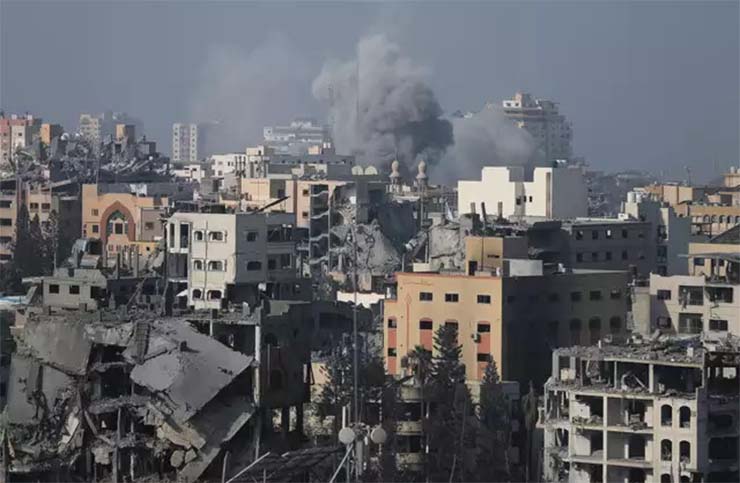
In the midst of the Israel-Hamas conflict in West Asia, the world’s attention is abruptly drawn to a pivotal geopolitical development: Russia’s announcement of withdrawal from a significant arms control treaty. This decision, amid the ongoing Russia-Ukraine war and contentious disputes over climate financing, adds layers of complexity to an already intricate global landscape.
As we reflect on the trajectory of human history, not only does our cognitive evolution come to the fore, but also the evolution of tools pivotal to our survival. Weapons, from rudimentary stones to advanced firearms, mark this journey. The invention of gunpowder, a consequential milestone, shaped the course of warfare. However, the paradigm shift came with the integration of missiles and nuclear energy, a transformation laid bare by the detonation of the first nuclear bomb in Alamogordo, New Mexico, during Operation Trinity. This event served as a stark warning to the global community about the perils of nuclear war, exemplified later by the devastating atomic bombings in Japan.
The Cuban Missile Crisis of 1962 prompted a global commitment to arms control as a means of averting the spectre of nuclear holocaust. Nevertheless, recent events suggest a regression, resurrecting the familiar threat of nuclear escalation. Russia’s withdrawal from the Comprehensive Test Ban Treaty (CTBT) serves as a stark reminder of this worrisome trend.
The CTBT, established in the mid-1990s, stands as an important arms control treaty that prohibits signatories from conducting nuclear tests across various domains—land, sea, space, and beyond. Envisioned to fortify existing arms control provisions and prevent the acquisition of nuclear weapons by new nations, the CTBT faces notable absentees among signatories, including Israel, Pakistan, and India.
Russian President Vladimir V Putin’s recent announcement, de-ratifying Russia from the CTBT, signifies not only a departure from treaty compliance but also an assertion of Russia’s “sovereign right” to conduct additional nuclear tests
Russia’s De-ratification and Nuclear Tests
Russian President Vladimir V Putin’s recent announcement, de-ratifying Russia from the CTBT, signifies not only a departure from treaty compliance but also an assertion of Russia’s “sovereign right” to conduct additional nuclear tests. This assertion was underscored by Russia’s recent nuclear test from the SSBN Alexander Imperator III nuclear submarine, demonstrating precision in hitting its designated target.
Global Geopolitical Challenges
The timing of Russia’s withdrawal holds particular significance, as global geopolitics grapple with the Russia-Ukraine war, the Israel-Hamas conflict, and contentious debates over climate financing. At this critical juncture, humanity finds itself at a crossroads where decisive action can either propel progress for our survival and the planet’s or plunge us into an ominous fate.
The urgency to address the monumental challenge of climate change is underscored by its accelerating pace—large sections of the Amazonian river have dried up, and the frequency of natural disasters is intensifying. In this already complex scenario, the spectre of terrorism further compounds global challenges, exemplified by the recent Hamas attack on Israel, resonating far beyond the immediate region.
Overlooking Impending Danger
Humanity, however, seems distracted by short-term gains, unable to grasp the impending danger hurtling towards us. While nuclear doctrines such as mutually assured destruction (MAD), first strike, second strike capability, and no first use (NFU) hold relevance for internal and external security considerations, they pale in comparison to the urgency of recognising and mitigating the imminent threats we face.
The urgency to address the monumental challenge of climate change is underscored by its accelerating pace—large sections of the Amazonian river have dried up, and the frequency of natural disasters is intensifying
Final Takeaways
As we navigate this delicate moment, transcending divisions becomes imperative. Fortifying nuclear security, enhancing global regulatory provisions on nuclear testing, and taking essential steps demand concerted efforts. In the wise words of Albert Einstein, “I know not what World War III will be fought with, but World War IV will be fought with sticks and stones.”
At this crucial juncture, the international community must prioritise collaborative action to address the imminent dangers confronting humanity, ensuring not only the survival of nations but the very planet we call home.
–The writer is currently working as a Research Associate at Defence Research and Studies (dras.in) and is a columnist. The views expressed are personal and do not necessarily reflect the views of Raksha Anirveda








